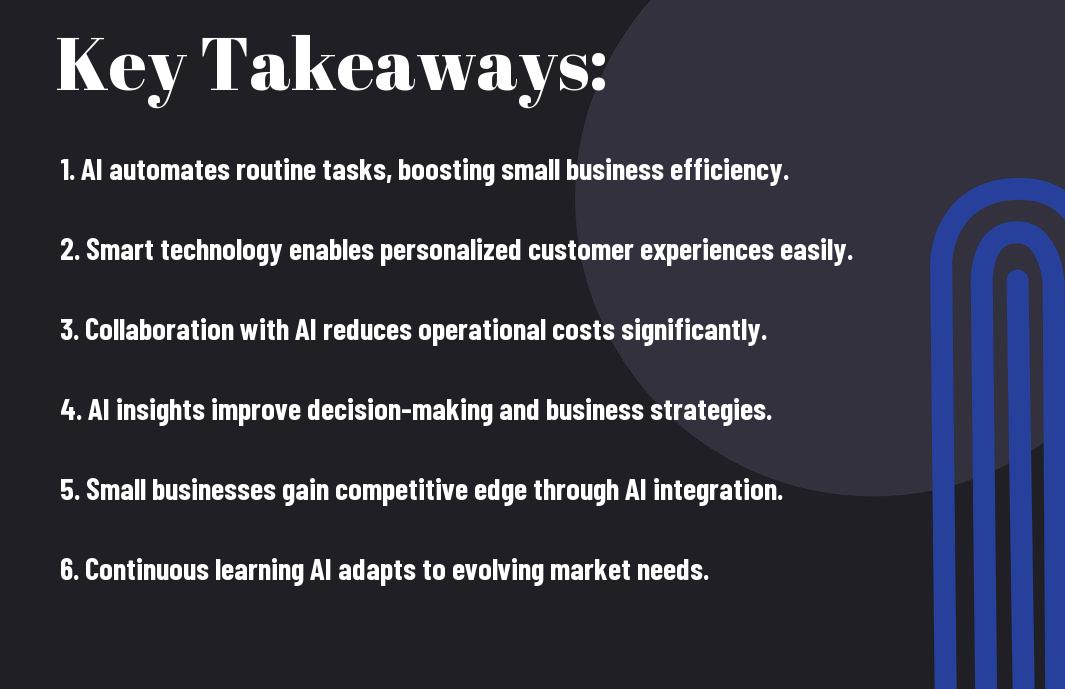Most small business owners are now discovering how artificial intelligence (AI) can revolutionize their operations and drive growth. By leveraging AI technology, you can automate tedious tasks, gain valuable insights into customer behavior, and enhance your decision-making processes. This collaboration not only increases your efficiency but also allows you to focus on innovation and customer satisfaction. In this blog post, we will explore how you can harness the power of AI to unlock your business’s potential and stay ahead in today’s competitive landscape.
Key Takeaways:
- Human-AI collaboration empowers small businesses by streamlining operations, improving efficiency, and unleashing innovative potential.
- Integrating smart technology enables data-driven decision-making, enhancing customer experiences and promoting business growth.
- Building a culture of adaptability and continuous learning helps small businesses leverage AI tools effectively, fostering a competitive edge in the market.
Understanding Human-AI Collaboration
AI technology is transforming the landscape of small businesses, offering innovative solutions that improve productivity and decision-making. By leveraging the strengths of both humans and machines, you can maximize your potential and enhance your competitiveness in the market. Embracing this collaboration will enable you to focus on strategic initiatives, while AI handles repetitive tasks, ultimately driving your business growth and customer satisfaction.
Defining Human-AI Collaboration
Collaboration between humans and AI involves integrating artificial intelligence systems into workflows to augment human capabilities. This synergy allows you to tap into AI’s analytical power and efficiency, enabling you to accomplish tasks that would otherwise be time-consuming or complex. By merging human intuition and creativity with AI’s data-driven insights, your business can unlock new avenues for innovation and success.
Importance in Small Businesses
With the rapid advancement of technology, small businesses can greatly benefit from human-AI collaboration by streamlining processes and enhancing customer experiences. By utilizing AI tools, you can automate routine tasks, gather valuable insights, and make data-informed decisions that drive growth. This not only reduces operational costs but also allows you to allocate more resources towards strategic initiatives that differentiate your business.
At this juncture, it’s crucial to understand that embracing human-AI collaboration can significantly impact the efficiency and effectiveness of your small business. You have the opportunity to gain insights from data analytics that were previously unattainable, enhancing your ability to tailor offerings to meet customer needs. Moreover, AI can help you identify trends and patterns that drive competitive advantage. By integrating these solutions intelligently, you’ll not only optimize your operations but also foster a culture of innovation that keeps you ahead in your industry.
Benefits of Smart Technology for Small Businesses
Any small business looking to thrive in today’s competitive landscape can greatly benefit from smart technology. By leveraging these innovative tools, you can streamline operations, improve efficiency, and enhance customer interactions, ultimately leading to increased profitability and growth. Embracing smart technology enables you to stay ahead of the competition while also providing a better experience for your customers.
Increased Efficiency
Increased efficiency is a hallmark of smart technology applications. Implementing automated systems helps you reduce time spent on repetitive tasks, allowing your team to focus on more strategic initiatives. By optimizing workflows and minimizing human error, you are better equipped to meet deadlines and exceed client expectations.
Enhanced Customer Experience
By utilizing smart technology, you can significantly enhance the customer experience. Customers increasingly expect personalized interactions and quick responses to their needs. Smart tools allow you to analyze customer data, tailor offerings, and predict preferences, creating a more engaging and seamless shopping journey.
Businesses that adopt smart technology can create a more targeted and tailored approach to customer service. Understanding your customers’ preferences enables you to provide personalized recommendations, while tools like chatbots can ensure 24/7 support. This level of service can foster deeper loyalty and drive repeat purchases. Focusing on customer satisfaction not only attracts new clients but also retains existing ones, making smart technology an important investment for your growth and success.

Key Areas for Implementation
All small businesses can greatly benefit from implementing smart technology across various key areas. By embracing AI-driven tools, you can enhance efficiency and productivity while staying ahead of the competition. Focus on areas such as marketing automation, inventory and supply chain management, customer service, and data analytics to maximize your business potential and create a more responsive, agile operation.
Marketing Automation
Before entering into marketing efforts, consider utilizing marketing automation tools that align with your goals. These AI-driven platforms can help you streamline processes, such as email campaigns and social media posting, allowing you to target the right audience at the right time while optimizing your marketing budget.
Inventory and Supply Chain Management
About inventory and supply chain management, it’s important to leverage AI to optimize stock levels and streamline processes. With technology, you’re able to make informed decisions that enhance operational efficiency and meet customer demand effectively.
In fact, incorporating smart technology in your inventory and supply chain management can significantly reduce costs and minimize waste. By utilizing predictive analytics, you can forecast demand more accurately, ensuring you have the right amount of inventory on hand. Moreover, AI can enhance supplier relationships through real-time data sharing, making it easier to identify potential disruptions and adapt swiftly. This proactive approach not only drives profitability but also fosters customer satisfaction by ensuring timely product availability.
Challenges in Adopting AI Solutions
Your journey towards incorporating AI solutions into your small business may present several challenges that require careful navigation. These challenges can stem from various factors, including cost implications and the need for technical expertise. It’s important to recognize these obstacles early on to develop a strategic approach to integration, ensuring that your investment in smart technology yields the best possible returns.
Cost Considerations
Cost is often a significant factor when considering AI adoption in your small business. Initial investments in technology and software can be substantial, but you should also factor in ongoing maintenance and potential upgrades. Additionally, budget constraints might limit your options for high-quality solutions, making it crucial to evaluate your priorities and choose technologies that align with your financial capacity.
Technical Expertise Requirements
On the technical side, implementing AI solutions requires a level of expertise that may not currently exist within your team. This can lead to challenges in the deployment and optimization of AI tools, as lack of knowledge might hinder effective usage and diminish the expected benefits of the technology.
Hence, you may find it necessary to invest in training for your team or consider hiring external experts with experience in AI implementation. This can be a double-edged sword; while it offers the potential for enhanced performance and innovation, it also adds to your overall costs. You’ll need to weigh the benefits of AI against the resources required to cultivate the necessary skills within your organization. Investing in technical knowledge can lead to greater autonomy and less reliance on external sources in the long run, helping your small business thrive with smart technology.
Case Studies of Successful Implementation
After examining various industries, you can see that many small businesses have successfully integrated smart technology to boost their growth. Here are some compelling case studies:
- Retail: A local clothing store increased sales by 30% after implementing an AI-driven inventory management system.
- Restaurants: A cafe saw a 25% reduction in food waste with a predictive analytics tool that managed supply orders.
- Consulting: A small consulting firm improved client satisfaction scores by 40% through automated project management tools.
- Online Retail: An e-commerce store recorded a 50% increase in conversion rates by using AI-powered personalized marketing.
Retail Sector
Studies indicate that retailers using AI have witnessed a significant enhancement in operational efficiency. For instance, a smart pricing tool allowed a local fashion brand to dynamically adjust prices based on market trends, leading to a 20% increase in foot traffic.
Service Industry
Implementation of AI solutions in the service industry has proven to be a game changer. Small businesses are using AI-based chatbots to manage customer inquiries, resulting in a 50% decrease in response time.
In addition, by automating mundane tasks, you can focus on delivering enhanced customer experiences. The use of AI chatbots not only reduces workload but also captures vital customer feedback, resulting in improved service. This has shown to boost customer retention rates by up to 30%, proving that combining human insight with AI’s efficiency can transform your business approach. Failure to adapt may lead to losing your competitive edge, underscoring the importance of embracing smart technology.

Future Trends in AI for Small Businesses
Now, as you look toward the future, AI is poised to revolutionize small businesses by streamlining operations and enhancing customer experiences. With the rise of intelligent automation and predictive analytics, you can expect more personalized interactions, efficient workflows, and data-driven decision-making. Staying ahead of these trends will be important for your business to thrive in an evolving market.
Evolving Technologies
About the future of AI, technologies such as machine learning, natural language processing, and computer vision are rapidly advancing. These innovations will not only enable you to automate mundane tasks but also provide deeper insights into your customer behavior, allowing for more targeted marketing strategies that align with your business goals.
Predictions for Growth
Alongside these evolving technologies, experts predict that small businesses leveraging AI will see significant growth in the coming years. Enhanced customer engagement and improved operational efficiency will be at the forefront, enabling you to scale your business in ways previously deemed unachievable. Prepare for shifts in industry dynamics as AI-driven solutions reshape competitive landscapes.
Small businesses that proactively adapt to these trends will gain a competitive edge. With AI tools that offer predictive insights, you’ll have the opportunity to anticipate customer needs and respond swiftly. These advancements can lead to increased revenue and improved customer loyalty. However, you may also face challenges; being aware of potential security risks and data management issues is important. Prioritizing data privacy and ethical AI implementation will safeguard your business’s reputation in this transformative landscape.

Final Words
Drawing together the insights on human-AI collaboration, you can transform your small business potential by leveraging smart technology. Embracing AI in your operations allows you to enhance efficiency, improve decision-making, and provide personalized customer experiences. By tapping into resources such as AI For Small Business: How Artificial Intelligence …, you can stay ahead of the competition and unlock new growth opportunities. Embrace the synergy of human creativity and artificial intelligence to drive innovation and success in your business endeavors.
FAQ
Q: How can small businesses benefit from using AI technology?
A: Small businesses can leverage AI technology in various ways to enhance their operations and improve efficiency. AI can help automate repetitive tasks, such as data entry and customer service responses, allowing employees to focus on more strategic activities. Additionally, AI-powered analytics can provide valuable insights about customer behaviors and trends, enabling businesses to make informed decisions about their products and marketing strategies. By integrating AI, small businesses can streamline processes, reduce costs, and ultimately increase competitiveness in their industry.
Q: What are some examples of AI tools specifically designed for small businesses?
A: There are numerous AI tools available that cater to the needs of small businesses. For instance, customer relationship management (CRM) systems like Zoho and HubSpot utilize AI algorithms to analyze customer interactions and predict future behavior, enhancing customer personalization. Additionally, chatbots, such as those from Drift or Intercom, can assist with customer service, providing instant responses to inquiries while freeing up staff. AI-driven marketing platforms like Mailchimp also utilize algorithms to optimize email campaigns and target audiences effectively. These tools enable small businesses to operate more efficiently and engage meaningfully with their customers.
Q: How do small businesses implement AI solutions without extensive technical knowledge?
A: Implementing AI solutions does not necessarily require extensive technical expertise. Many AI tools available for small businesses are user-friendly and designed for individuals who may not have a coding background. Providers often offer step-by-step guides, tutorials, and customer support to assist users in getting started. Additionally, businesses can consider partnering with local technology consultants or agencies that specialize in AI integration to provide guidance tailored to their specific needs. By choosing accessible tools and seeking support, small businesses can successfully incorporate AI into their operations.


